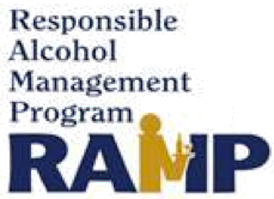WHAT IS RAMP CERTIFICATION?
Legislation enacted on June 18, 2001, established the Responsible Alcohol Management Program, which is a voluntary certification that provides incentives for licensees who participate and complete five components. Act 26 of 2006 requires any licensee who has been found guilty by an Administrative Law Judge of sales to minors or visibly intoxicated persons to comply with RAMP for a period of up to one year. A licensee may also be mandated to complete RAMP as part of a conditional licensing agreement (CLA). RAMP is the umbrella term used to describe this collection of training and resources available to licensees and their employees. Completion of the program provides certification to the licensed establishment for two years. In order to comply, the establishment must complete all parts of the program, which include: Owner/Manager Training, Server/Seller Training, New Employee Orientation, Signage and Affidavit Request for RAMP Certification.
1. Owner/Manager Training: In order to comply with this component, an owner and/or the PLCB-approved manager must complete this training which is offered by the Pennsylvania Liquor Control Board. Act 113 of 2011 requires all managers approved by the PLCB to complete this training component within 180 days of approval, unless successfully completed within the previous two years. Licensees may choose to complete this training online or attend classroom training. Classroom training is offered weekly throughout the commonwealth. Training is valid for two years. To complete online or to obtain a list of classroom trainings, please visit www.lcb.state.pa.us(Click Alcohol Education-RAMP-Owner/Manager Training).
2. Server/Seller Training: This component is the focus of today’s training. In order to fulfill this requirement, at least 50 percent of the licensee’s alcohol service staff must complete this training. Included in that group is anyone who serves alcohol and/or checks IDs, as well as owners and managers. This percentage must be maintained at all times. Trainees are required to complete a course examination and must receive an 80 percent or better in order to receive credit in this course. Training is valid for two years. You chose to complete this training online but licensees may also choose to attend classroom training conducted by a PLCB-approved instructor. A list of all approved instructors and online providers is available on the PLCB’s website www.lcb.state.pa.us (Click Alcohol Education-RAMP-Server/Seller Training). The list changes periodically, so please make sure you have an up-to-date list before scheduling training.
Note: Act 11 of 2011 requires all alcohol service personnel working at an off-premises catering event be RAMP server/seller-trained.
3. New Employee Orientation: The third component consists of orientation for all members of the alcohol service staff. The PLCB will provide the orientation form and appropriate learning materials. Licensees are required to conduct a new employee orientation within 30 days of employee’s hire. It is the sole responsibility of the licensee to ensure that either the owner, manager or a designated instructor conducts the orientation. Licensees shall maintain these records for all employees for the duration of their employment.
4. Signage: The fourth component consists of displaying posters or signs regarding responsible alcohol service. Appropriate signage is available from the PLCB. However, the licensee may use other signage, providing that it is equivalent size, number, and content of the PLCB’s signage. Signage must be prominently displayed so that it can be easily observed by patrons. Licensees shall be responsible for posting and maintaining the signage at all times. Signage must include at a minimum, the following information:
*Acceptable forms of ID and
*Refusal of alcohol service to minors and visibly intoxicated patrons
5. Affidavit Request for RAMP Certification: After completion of all four listed requirements, the fifth and final component requires the licensee to complete an affidavit request for RAMP certification. Visit the PLCB’s website www.lcb.state.pa.us to complete the affidavit or contact your regional RAMP office for assistance. The licensed establishment will receive RAMP certification providing all requirements are met.
Use the map below to locate your region. Whenever possible, call your local RAMP office.
Western Pennsylvania Central Pennsylvania South Eastern Pennsylvania
412.723.0109 717.558.2160 610.940.1217
** These numbers are subject to change. In that event dial 866.275.8237
Maintaining Compliance:
Once the establishment has become RAMP certified, it’s up to the management to maintain compliance.
* If the owner or manager who completed the owner/manager training changes, the new (or another) owner/manager has 60 days to complete training.
* If the number of server/seller trained employees falls below 50 percent, additional employees must be trained within 60 days.
* It is recommended that the new employee orientation be completed on or before the first day of employment for the licensee’s alcohol service staff but must be completed within 30 days of his/her hire date.
* Add all new employees to the alcohol service staff roster.
* Maintain posting of signs at all times.
Note: Failure to maintain these guidelines may void the establishment’s certification.
Benefits To The Licensee Include:
* Possible reduction in the fines and penalties issued by the Administrative Law Judge to the licensee for serving a minor or a visibly intoxicated patron, as long as the licensee was in compliance at the time of the violation and had no citations for either of those two violations in the previous four years.
* Possible liquor liability insurance discount
* Knowledgeable, well-trained alcohol service staff and managemen
* Recognition as a responsible licensee in your community
* Less likelihood of dram shop liability


